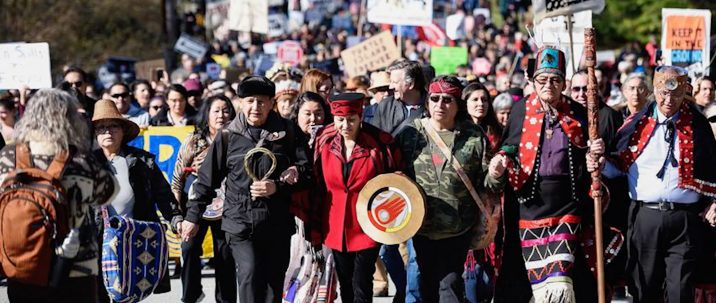CMS/W’s Civic Design Initiative is launching a sustainable communications infrastructure for collaborative climate adaptation, called The Deep Listening Project.
The project has been submitted as part of the Climate Grand Challenges, MIT’s moonshot program to “mobilize the entire MIT research community around some of the most challenging unsolved problems in adaptation, carbon removal, climate science, climate policy, human impacts, and reducing emissions.”
The project stands out from other challenge proposals because of its focus on a co-design process — ensuring there are collaborations between institutions with advanced technical knowledge about climate change and the frontline and indigenous communities with ground truth knowledge of how proposed solutions will be enacted and sustained.
CDI’s Faculty Director, Professor James Paradis from MIT’s Comparative Media Studies/Writing department, says that “increasingly, we are seeing groups like the Union of Concerned Scientists, the Intergovernmental Panel on Climate Change, and NGOs warning of increasing risk from climate change with a sense of failure or difficulty of getting community partnership in taking steps to lower the risk levels.” But in citing a successful, community-led adaptation process in Fiji, CDI co-director and CMS/W visiting professor Eric Gordon adds that “we have limited understanding of the communication infrastructure that made it successful. How did local knowledge and scientific knowledge come together to form mutually acceptable solutions?” The CDI team, Gordon says, wants to help avoid the recurring problem that “every time a community needs to adapt, it’s as if we’re starting from scratch.”
The Initiative’s other co-director Yihyun Lim says that the team sees understanding communicating infrastructures in the current adaptation processes as a design challenge “to map, visualize, and intervene. How can we map the existing system of communication and knowledge transfer between communities and organizations in order to identify design opportunities for intervention?”
The Climate Grand Challenges feature an extraordinary collection of MIT faculty reviewers, though only a few — two economists and an historian — are based in MIT’s School of Humanities, Arts, and Social Sciences. This presents an opportunity for partnerships among university-based humanists and civics researchers. As such, the Deep Listening Project includes MIT’s Civic Design Initiative, Center for Constructive Communication, and Open Documentary Lab; Carnegie Mellon University’s Transition Design Institute; the University of Southern California’s Civic Paths; and the University of Maine’s Wabanaki Center for Adaptive Capacity and Climate Change. They will work with implementation partners at the Southeast Regional Climate Adaptation Science Center, Nepal’s Institute for Integrated Development Studies, the Red Cross/Red Crescent Climate Centre, the World Bank, and the United Nations Development Program.
But above all, these researchers will work with frontline and indigenous communities. In the first two years, those communities will include ones in the United States and Nepal. In the following years, the project hopes to expand to Rwanda, Côte d’Ivoire, Brazil, Colombia, or Argentina.
“If the Deep Listening Project is selected as a flagship project,” Gordon says, “it will represent MIT’s commitment to directing emerging technologies to making institutions better and more humane partners to some of the most vulnerable communities around the world as they adapt to the changing climate.”
What the Civic Design Initiative calls “deep listening” is made up of five components:
- Knowledge sharing: Creating the baseline rules and technical infrastructure for data and information sharing between institutions and frontline communities.
- Holding space: Designing digital and physical spaces for open and safe dialog among stakeholders.
- Co-production and sharing of climate imaginaries: Creating tools and platforms for local storytelling that are informed by climate science and legible to decision-makers.
- Sensemaking with a diversity of perspectives and scientific data: Developing easy to use, AI-informed tools for institutions to make sense of a variety of inputs from frontline communities.
- Evaluation and monitoring support to assure accountability and to assess quality of information: Creating tracking technologies and protocols that hold institutions and communities accountable to adaptation plans.
“The project is about creating tools and mechanisms to ensure deep listening for both sides of the adaptation process — communities and organizations,” Lim says. “Institutions need better tools and methods to listen to communities, and communities need to also listen, monitor and remain engaged throughout the adaptation process.”
The Civic Design Initiative’s home at MIT is in Comparative Media Studies/Writing and thus draws upon CMS/W’s long pedigree in participatory research and co-design. Since the early 2000’s, CMS/W faculty and researchers have developed collaborative projects in fields ranging from youth media literacy to algorithmic documentary storytelling.
Their partners will bring their own expertise. Civic Paths will bring their years of expertise to design interactive workshops that support and document local climate imaginaries. The Transition Design Institute at Carnegie Mellon will support institutional planning processes for radical transitions; their work adds to the team’s capacity to do long-term design work focused on paradigm shifts. And the University of Maine brings long term relationships with tribal groups around the United States and Indigenous methods of collaborative research.
Paradis says the hopes and expectations of the project “center on our providing valuable improvements in the quality and effects of communication among the frontline communities facing changing climate change.”





